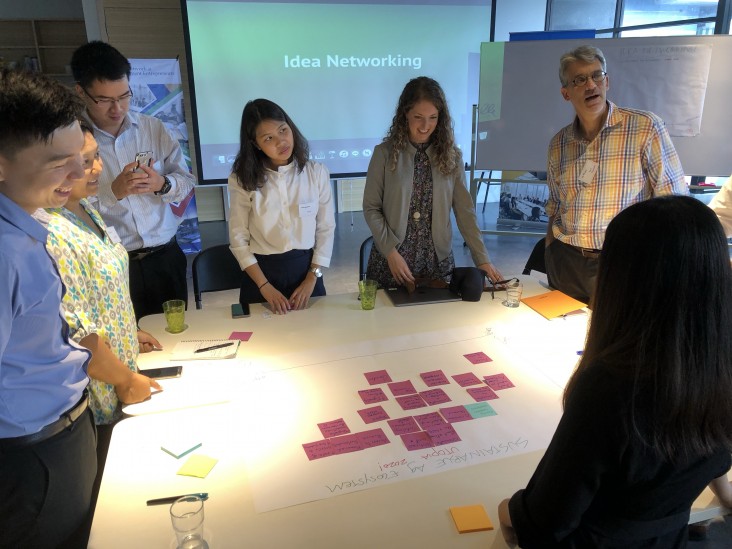Speeches Shim

BANGKOK, November 22, 2018 – What is the business case – the ideal eco-system – for sustainable agriculture and forestry? Is certification worth the cost? How to feed a growing world as youths leave farming? From Thai social enterprises working with organic rice farmers to one of the world’s largest coffee producers, speakers at Aspen Network of Development Entrepreneurs’ (ANDE) inaugural lab on sustainable agriculture, held in Bangkok on November 22, brainstormed a new agricultural eco-system to feed a growing world with shrinking natural resources.
“There’s no getting around it: we need more active participants in this evolving ecosystem,” said Angela Hogg, the Environment Office Director of the U.S. Agency for International Development (USAID) office in Asia. “Asia’s food security and environmental protection goals cannot be met without more smallholder producers and businesses adopting more sustainable practices.”
The UN Food and Agriculture Organization estimates smallholder producers supply some 80 percent of the world’s food.
The challenge to transform agriculture is ambitious and the time short, added Hogg, referring to a recent UN report that called for “unprecedented” action to cut carbon emissions.
USAID Green Invest Asia, a facility brokering private sector investments in Asia’s mid-sized sustainable businesses launched by the U.S. Agency for International Development, led the event. “Current investment is insufficient based on Asia’s projected food needs, alone,” said Christy Owen, the facility’s director. “We need to find a new way to do agribusiness. Urgently.”
DBS, a financial services firm, and the UN Environment Programme have estimated an additional $400 billion is needed between now and 2030 to adequately protect the people, environment and economies of ASEAN countries from the worst effects of climate change and land degradation.
Citibank Foundation, UN Capital Development Fund, the online lending platform Kiva and Asia Development Bank were among the more than 40 attendees. Kiva’s largest lending sector is agriculture, said Mark McDonagh, its investment manager in the Asia-Pacific region.
While most of Kiva’s loans are micro-loans of $5,000 or less, there is a growing number of larger loans going to social enterprises, mostly in the field of agriculture, said McDonagh. “A flexible agriculture loan isn’t rocket science. The issue is whether an investor has the risk appetite.”
Barriers
Relatively few businesses participate in the sustainable marketplace, with most actors coming from multinational corporations. In breakout sessions to suggest ways to build a new agricultural economy, access to flexible agriculture loans and breaking into the global green marketplace surfaced as common themes.
The U.S. Government identified this gap when founding the USAID Green Invest Asia facility, which helps sustainable businesses become investment ready and links them to investors interested in the triple bottom line, an accounting framework with three parts: social, environmental and financial.
McDonagh, who helps direct lenders to investments that match their interests, said lenders have always valued innovation in choosing projects to fund.
Solutions
“Farmers are, by nature, hackers,” said Bryan Hugill, co-owner of the Thailand-based social enterprise, Raitong Organics. His 11-year-old farm has 43 ongoing innovation experiments, some in coordination with research labs worldwide, including: biodynamic rice farming where chemical fertilizers are replaced with natural bacteria; microbial fuel cells, or the use of bacteria to drive electric currents; deep-litter pig farming; stingless beekeeping, and cataloguing effective microorganisms.
Additional labs on innovation in agriculture to be organized by ANDE include: lessons learned in agricultural technology with USAID Feed the Future Asia; the role of women as sustainable consumers and investors with ANDE, and agricultural service delivery to smallholder farmers with Syngenta Foundation for Sustainable Agriculture.

Comment
Make a general inquiry or suggest an improvement.